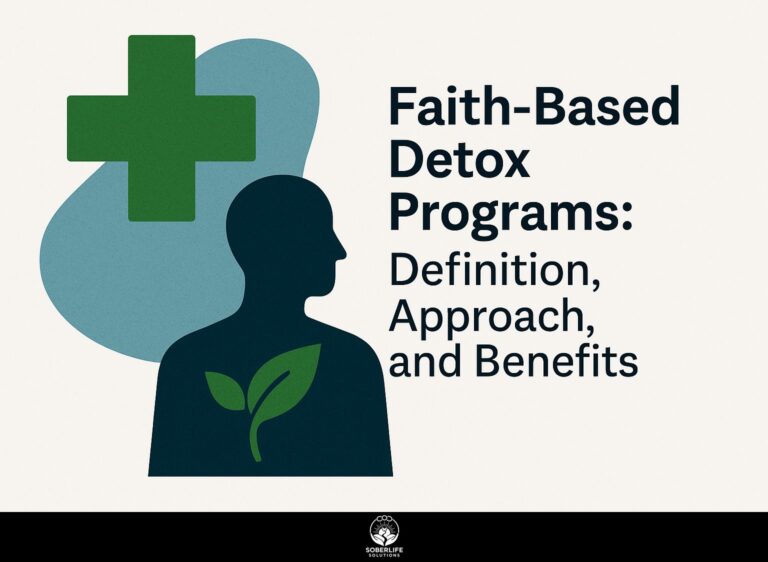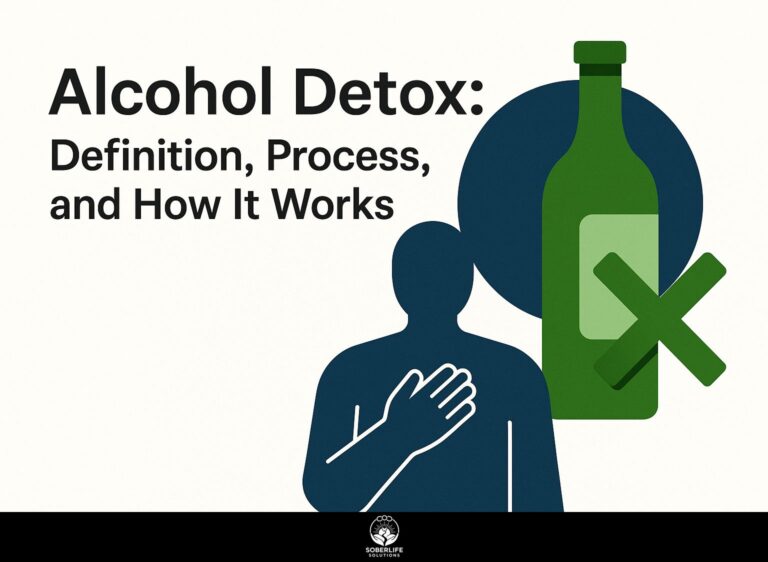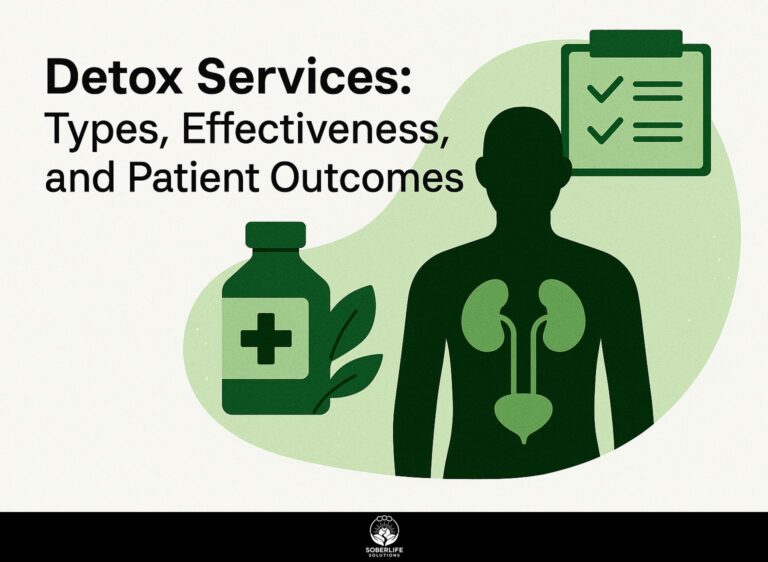Women’s Detox Programs: Definition, Services, and Benefits
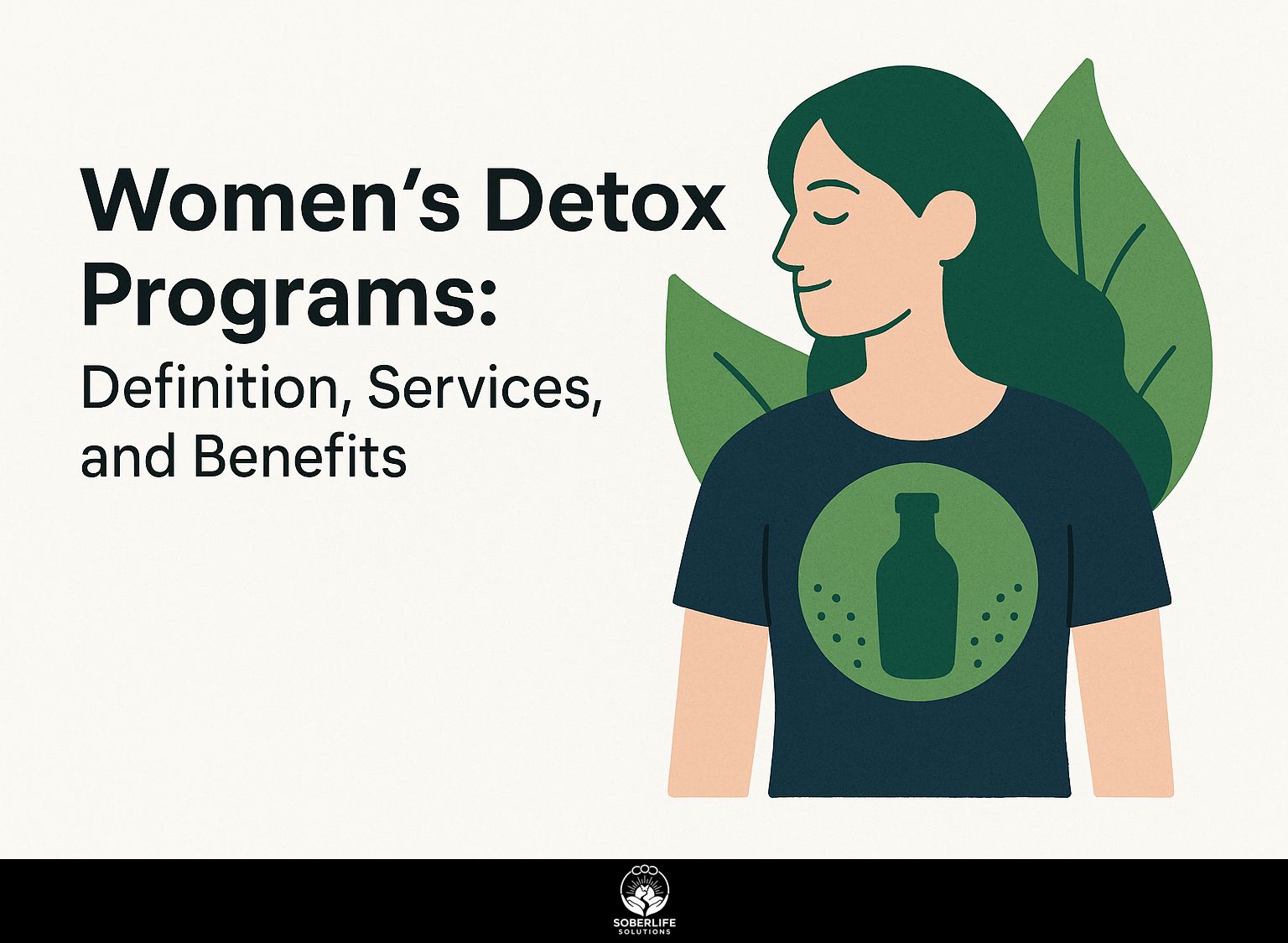
Recognizing the difficulties in dealing with addiction is particularly important for women. That’s why detox programs specifically for women are key in addressing substance use issues. Facilities such as Midwest Detox Center in Ohio and Alina Lodge provide treatment programs specifically for women. These programs include mental health support designed to address the particular needs of women. This article looks into the meaning, services, and advantages of these special detox programs, showing how they support complete healing and self-improvement. Learn how a custom method can lead to better health.
Key Takeaways:
Overview of Detoxification
Detoxification is the process of clearing harmful substances from the body, often requiring medical supervision to manage withdrawal symptoms safely.
At this important stage of addiction recovery, doctors use different methods to keep patients safe and comfortable.
For instance, tapering medications like benzodiazepines can help reduce anxiety and seizures during withdrawal.
Supportive therapies such as cognitive-behavioral therapy or group counseling can address psychological challenges and build coping strategies (for an in-depth exploration, see our discussion on the impact of various recovery therapies).
Checking important health indicators and fluid intake is important because problems can develop. A complete detox plan covers both the physical side and prepares for long-term recovery.
Importance for Women’s Health
Substance use disorders can seriously impact women’s health. Treatment methods should be specifically designed for women to strengthen their emotional resilience and offer a supportive space.
It’s important to know the emotional and mental needs of women in detox programs. Women often face unique stressors, such as societal pressures and trauma, that influence their recovery. According to Frontiers in Psychiatry, understanding these specific needs is crucial for effective recovery strategies.
Effective treatments should include group therapy, which promotes sharing personal stories, and methods like yoga or mindfulness to lower anxiety. Involving family members can build a supportive network, enhancing emotional healing. Reducing stress and anxiety in alcoholism treatment is also crucial, as it can significantly impact the overall success of recovery programs tailored for women.
These custom methods help ease symptoms and help women feel more in charge of their recovery.
Definition of Women’s Detox Programs
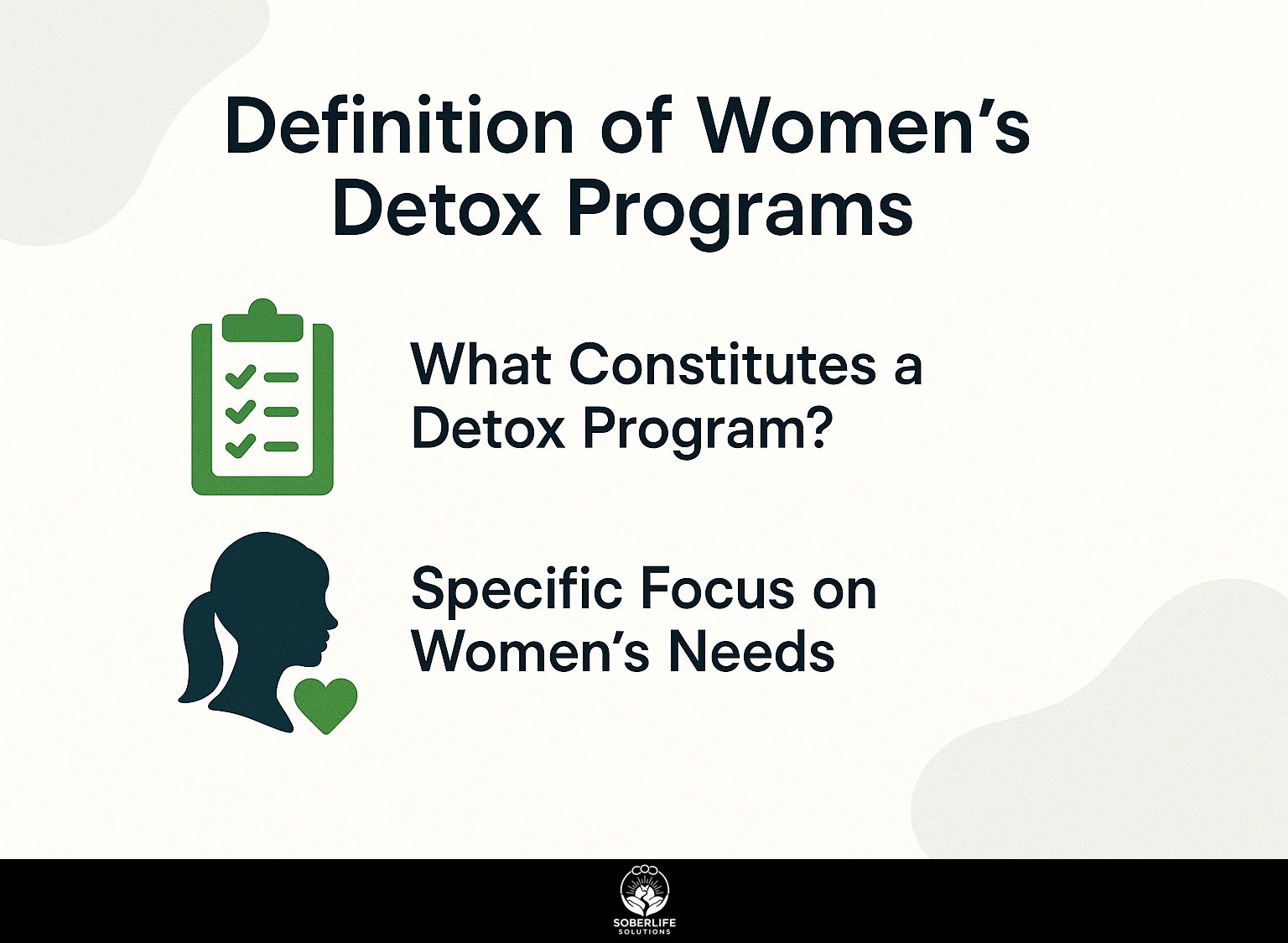
Women’s detox programs are treatment plans made just for women, including whole-body therapies and support from others.
What Constitutes a Detox Program?
A complete detox program usually consists of evaluation, help with managing withdrawal, and various therapeutic services provided in a supportive setting.
The initial evaluation helps doctors figure out how serious the addiction is, allowing for a customized plan.
Withdrawal management provides medical supervision, often including medications to ease symptoms. Therapeutic services, such as cognitive-behavioral therapy (CBT) and group therapy, address the psychological aspects of addiction.
For example, CBT can help individuals identify and change negative thought patterns linked to substance use. Using approaches like yoga or meditation also helps maintain emotional well-being.
By combining these parts, a detox program supports a safe and effective recovery process.
Specific Focus on Women’s Needs
Women’s detox programs focus on particular needs such as past trauma and other mental health issues. They provide customized care that emphasizes compassion and empathy.
These programs often combine therapy methods such as trauma-informed care, which recognizes past experiences and works to heal emotional wounds while building strength.
For instance, a program might use dialectical behavior therapy (DBT) to help women develop coping skills and emotional regulation.
Group therapy sessions can also create a supportive community, allowing women to share their experiences in a safe environment.
Including practices like yoga and mindfulness can help improve health, making it easier and more effective to recover.
Services Offered in Women’s Detox Programs
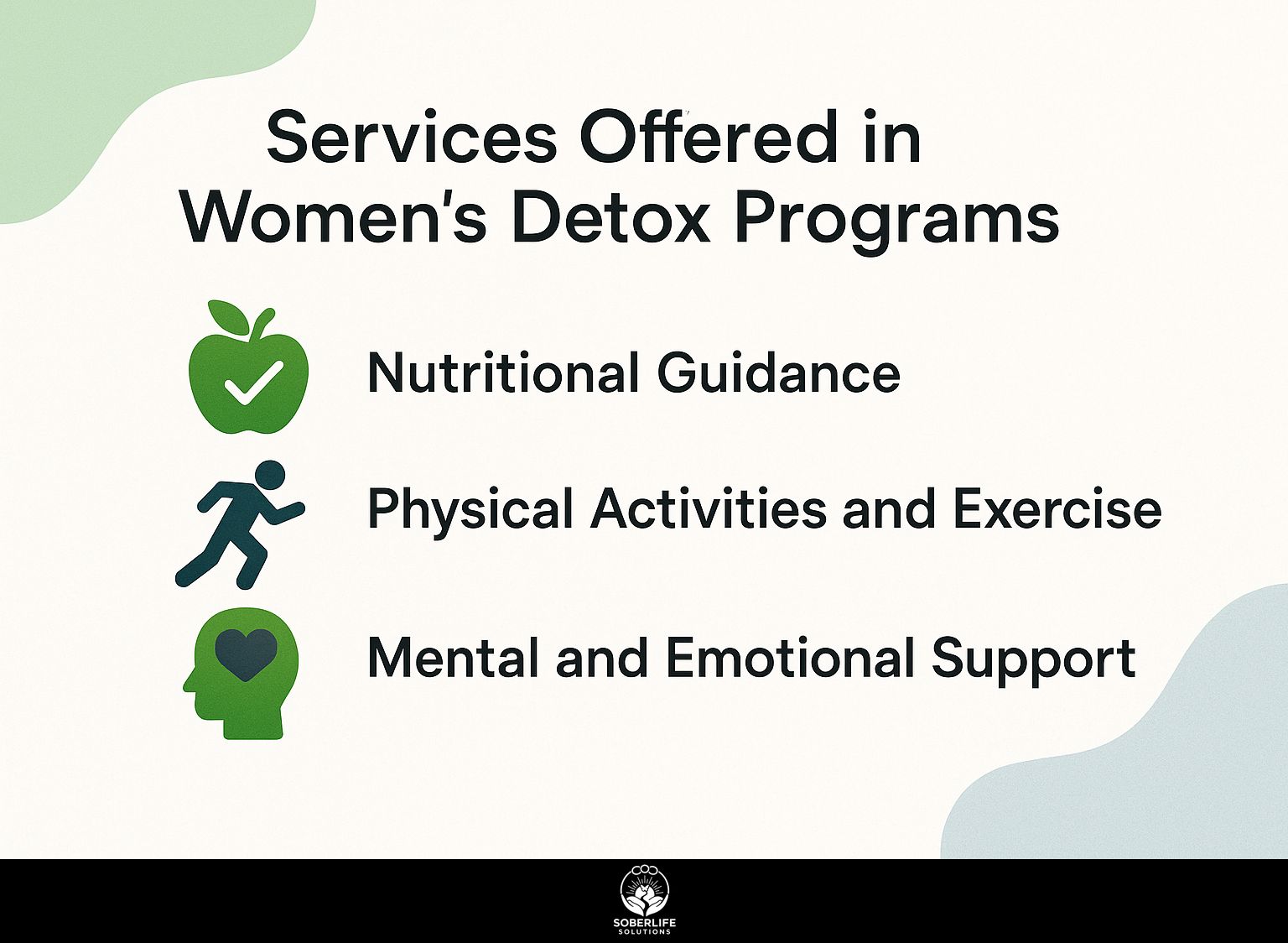
Women’s detox programs provide various services to help improve physical health, emotional wellness, and personal development during recovery. If interested, you can explore more about the role of peer support in these settings and how it impacts the recovery journey.
Nutritional Guidance
Nutritional advice in detox programs includes meal plans that help improve physical health and aid the body’s recovery after substance use.
A well-rounded detox diet may include fresh fruits, leafy greens, lean proteins, and whole grains.
For example, incorporating foods rich in antioxidants, such as blueberries and spinach, can help combat oxidative stress. Including sources of omega-3 fatty acids, such as salmon or flaxseeds, supports brain health, which is important during recovery. WebMD highlights how these nutrients are pivotal in addiction recovery and overall wellness in its coverage on Addiction and Nutrition.
Replacing processed sugars with natural sweeteners like honey or maple syrup can stabilize mood and energy levels.
Focusing on hydration-through water and herbal teas-supports kidney function and toxin elimination, enhancing overall recovery.
Physical Activities and Exercise
Incorporating physical activities into detox programs promotes both physical health improvements and emotional resilience among women in recovery.
Activities like yoga and group exercise are well-regarded for their overall benefits. Yoga improves flexibility and strength while encouraging awareness, which helps with emotional recovery.
For example, restorative yoga sessions help reduce anxiety, offering a peaceful space for reflection. Meanwhile, group exercises, such as Zumba or circuit training, encourage community support and accountability. A recent analysis from CNN highlights how exercise can be a powerful tool in addiction recovery, underscoring the importance of these activities.
Joining nearby classes can make working out more fun and less scary. Creating a routine that includes both types of activities can greatly improve the detox process. Related insight: Therapies for Recovery: Process and Impact Explained
Mental and Emotional Support
Mental and emotional support services, like one-on-one therapy and group meetings, are important for building strength and managing stress in women during detox.
Individual therapy provides women with a safe space to talk about their personal problems and develop customized strategies to manage them. Group sessions allow sharing experiences and gaining support from others.
Methods such as Cognitive Behavioral Therapy (CBT) can be effective in individual settings, helping to reframe negative thoughts. In contrast, group therapy often includes activities where participants practice mindfulness together, encouraging healing as a group.
Using both methods helps address personal and group aspects of healing, ultimately aiding emotional growth and resilience in recovery.
Benefits of Women’s Detox Programs
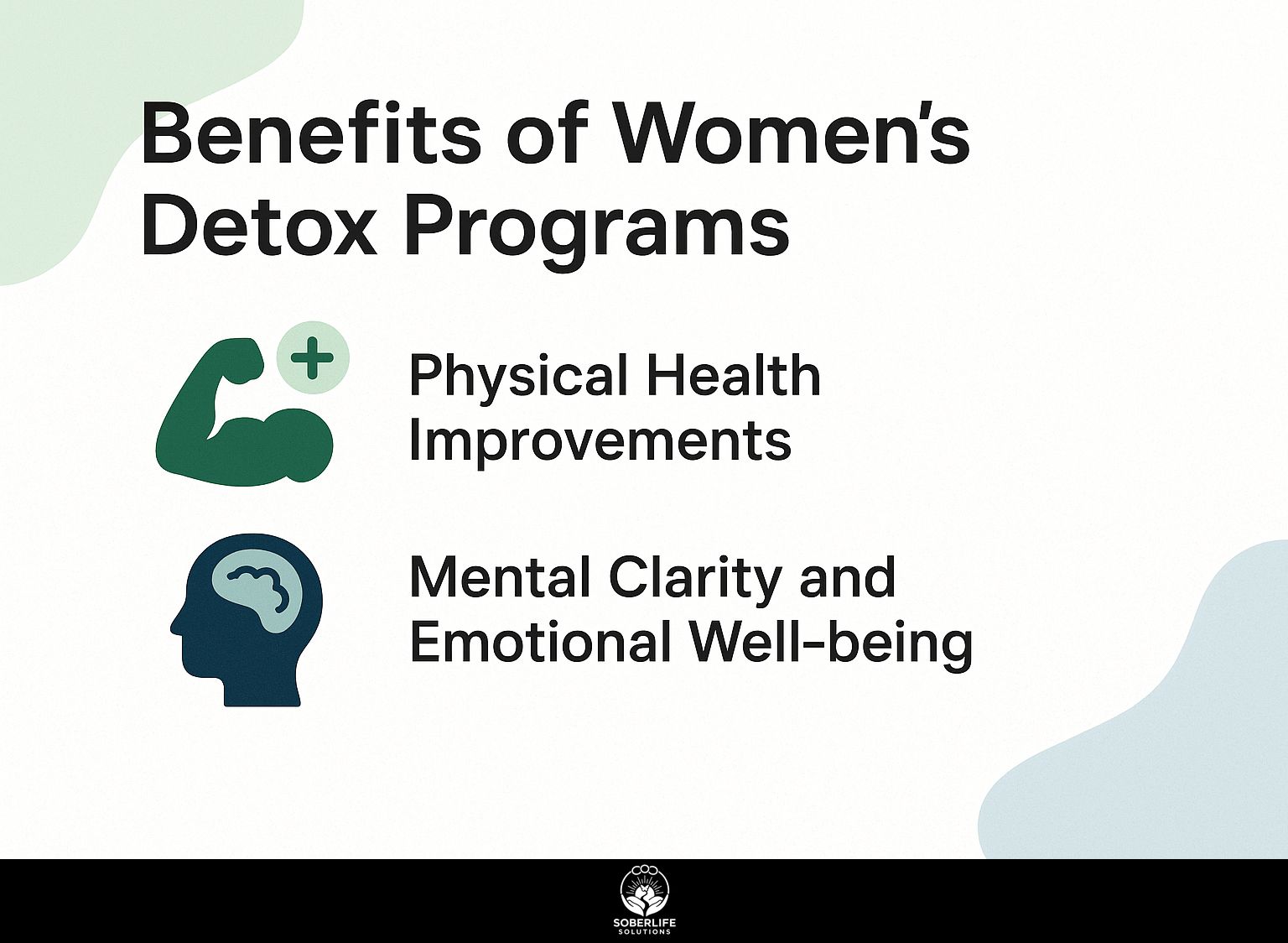
Women’s detox programs offer significant benefits that improve physical health and mental clarity, helping to achieve a successful recovery process.
Physical Health Improvements
Joining a detox program leads to noticeable physical health benefits, like fewer withdrawal symptoms and better overall health.
Research shows that people in organized detox programs report withdrawal symptoms decrease by about 50%, leading to an easier recovery process.
For instance, the Mindful Detox approach combines nutritional guidance and mindfulness practices, helping individuals regain balance. Utilizing tools like the MyFitnessPal app can track nutrient intake while keeping users accountable.
Taking supplements like milk thistle can support liver health and improve detoxification. These strategies relieve symptoms and support long-term health benefits.
Mental Clarity and Emotional Well-being
Women often find improved mental clarity and emotional health after finishing a detox program, creating a solid base for lasting recovery.
Detoxing can significantly improve mental health by reducing symptoms of anxiety and depression.
For example, using mindfulness practices like meditation or yoga during detox can improve emotional strength. Incorporating nutrient-rich foods-like leafy greens, berries, and nuts-supports brain function and mood regulation.
Journaling about feelings and experiences during detox further encourages self-reflection and emotional clearing. Many participants say they feel more at ease and balanced, which can help them communicate better with others and handle stress more effectively in daily life.
Choosing the Right Program
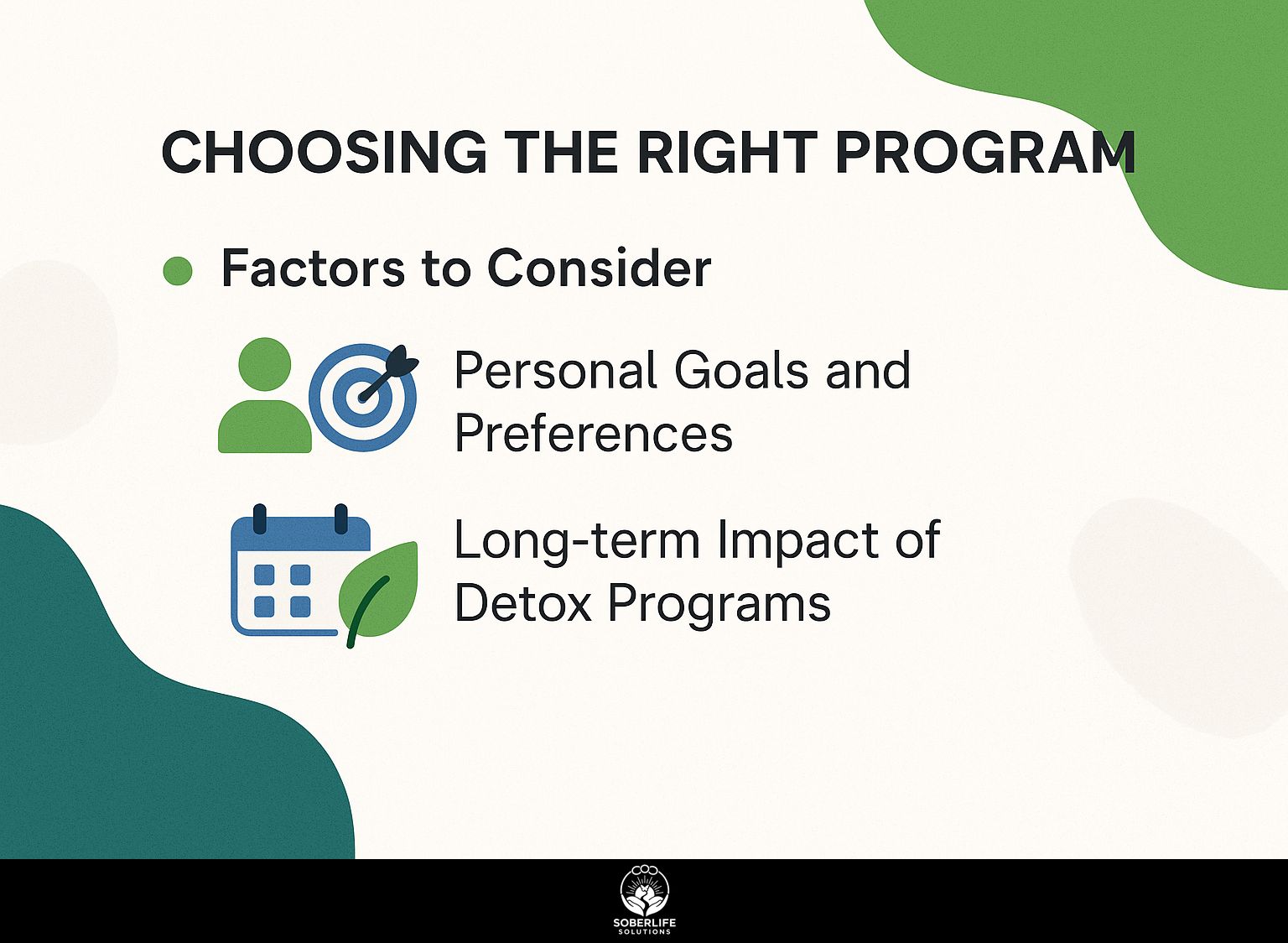
Choosing the best detox program for women requires thoughtful reflection on individual objectives, methods of therapy, and particular needs for healing.
Factors to Consider
Key factors to consider include the program’s focus on gender-specific treatment, availability of community support, and the types of therapies offered.
Evaluate the program’s duration and flexibility. Programs such as Promises Treatment Centers offer different paths for men and women, creating a recovery space that considers individual needs.
Community support can show up in group therapy sessions or online forums, which increase participation and consistency. Look into the variety of treatments as well; for example, options at The Meadows like yoga or art therapy can work well alongside traditional methods.
Looking at these factors will help confirm that a detox program matches personal recovery goals and improves its overall success.
Personal Goals and Preferences
Connecting a detox program with a woman’s individual aims and choices is important to offer a helpful and efficient recovery process.
To choose the right detox program, begin by identifying your main goal-whether it’s losing weight, increasing energy, or achieving better mental focus.
For instance, if weight loss is a goal, consider programs like the Whole30, which emphasizes whole foods and eliminates processed items. On the other hand, to increase energy, consider juice cleanses or programs like the 10-Day Detox Diet that focus on foods high in nutrients.
Evaluate each option based on your lifestyle, budget, and dietary restrictions, ensuring the chosen plan feels sustainable and motivating to you.
Long-term Impact of Detox Programs
Detox programs can improve emotional strength and help create lasting friendships, which are important for long-term recovery.
People in detox programs often feel a strong sense of belonging. Group therapy sessions encourage open discussion, where women can talk about their challenges and successes, which is crucial for maintaining recovery.
These connections give emotional support and help people stay responsible. Programs such as SMART Recovery emphasize group help and offer strategies for handling urges and cravings. Curious about how detox centers facilitate these connections? Our detailed overview highlights their role in alcoholism recovery.
Doing group activities like art therapy or wellness workshops helps people connect with each other. This makes recovery a group effort that continues even after the program ends.
Frequently Asked Questions
What is a women’s detox program?
A women’s detox program is a specialized program designed to help women overcome addiction and dependency on drugs or alcohol. It involves a combination of medical and psychological treatments to help women safely and effectively rid their bodies of harmful substances.
What services are offered in a women’s detox program?
Women’s detox programs typically offer a range of services including medical detox, therapy, counseling, and support groups. These programs are designed specifically for women and might include therapies like yoga, meditation, and nutrition counseling.
How long does a women’s detox program last?
The length of a women’s detox program can vary depending on the individual’s needs and level of addiction. It can last from a few days to a few weeks. The program helps women safely clean their bodies and begin healing.
What are the benefits of a women’s detox program?
The benefits of a women’s detox program include a safe and supportive environment for detoxification, access to medical and psychological support, and a focus on addressing the unique needs and challenges that women face in addiction and recovery. These programs also provide a strong foundation for long-term sobriety and a healthier lifestyle.
Who can benefit from a women’s detox program?
Women of all ages who struggle with addiction and substance abuse can benefit from a women’s detox program. These programs are especially beneficial for women who may have underlying mental health issues, past traumas, or other factors that contribute to their addiction.
Can a women’s detox program be combined with other treatment programs?
Yes, a women’s detox program can be combined with other treatment programs such as inpatient or outpatient rehabilitation, therapy, and support groups. This complete approach can offer the greatest opportunity for successful recovery and continued sobriety.

